Main Menu
Latest Blog Entry
User login
Guide to eating before competing
“When should I eat before a competition?”
is one of the questions we are asked most often, followed by “What should I eat before matches?” Pre- competition nutrition is a vital part of any athlete’s preparation. Maximising available energy and properly hydrating are necessary to ensure that you perform at your best.
What to eat
In order to maximise energy for competition, athletes should eat meals high in carbohydrate. However it is important to select the right types of carbohydrate to ensure that energy is released slowly and can be sustained throughout the duration of the competition. The table below shows which foods are high in slow release carbohydrates and which release energy faster.
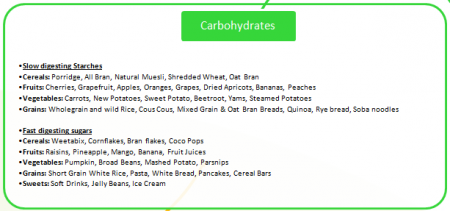
Eating foods high in fast release carbohydrates too soon before competition will mean a rapid increase in blood glucose levels. This in turn will lead to production of the hormone insulin which acts to remove glucose from the blood and store it in the liver, where it is not available for energy production.
However, these foods are ideal immediately after training or competition when replenishing the body’s energy stores becomes a big priority.
Fat is less readily used as an energy source during competition due to the high intensity, so keep ingestion of fats and high fat proteins to a minimum in the lead up an event.
This will leave more room for carbohydrates, and reduce the likelihood of gastric discomfort which high fat foods can cause due to longer digestion times. The table below shows a list of lean, medium and high fat proteins.
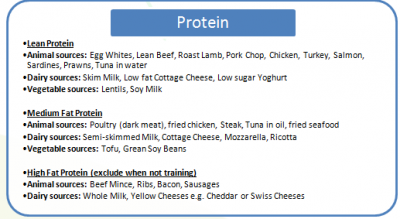
Keeping hydrated is vital for performance as it will allow you to perform well physically and stay mentally focussed. Try and drink regularly throughout the day rather than drinking lots in a few bursts, as your body will be able to absorb the fluid better. See how much fluid you should be drinking each day here.
When to eat
This will depend on the time of your competition, here are some examples of common meal timings for different competitions:
Morning
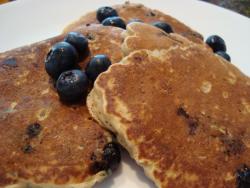 8am Breakfast- poached eggs on wholegrain, blueberry and oat pancakes (inspired by pancake day) and/or small bowl of natural muesli. water (more here).
8am Breakfast- poached eggs on wholegrain, blueberry and oat pancakes (inspired by pancake day) and/or small bowl of natural muesli. water (more here).- 10am Competition- If you struggle to eat before an early competition, sports drinks can be very useful source of energy and are easily digestible.
Only start consuming once your warm up has started to avoid an insulin spike.
- Immediately post competition- fast digesting carbohydrates and protein for fast energy replenishment
- 2 hours post competition- Try and eat a full meal consisting of slow releasing carbohydrates, protein for recovery and fruit and/or vegetables for vitamins and minerals. 2 hours post exercise is the window of opportunity for maximum glycogen storage in the body.
Afternoon
- 8-9am Breakfast- large breakfast to maximise energy storage e.g. poached egg on toast, porridge with berries, grapefruit. Water
- 12-1pm- top up energy levels without overeating e.g. small sweet potato with grilled chicken breast. Water
- 3pm- Competition
- Immediately post competition- see above
- 2 hours post competition- see above
Evening
- 8-9am Breakfast- large breakfast. Water
- 11am Snack- mixed nuts and dried fruit. Water
- 1-2pm lunch- Grilled salmon and steamed rice and veg. Water
- 3.30-4pm- small jacket potato with tuna. Water
- 7pm- Competition
- Immediately post competition- try and stick to same principles of post competition nutrition, however if you cannot manage 2 meals at this time, make sure you have one good meal.
Summary
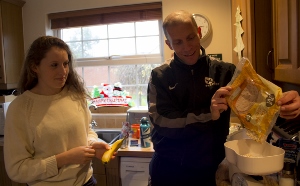 Whatever time your competition takes place, the same principles of eating plenty of slow release carbohydrates, limiting fat and maintaining hydration should apply.
Whatever time your competition takes place, the same principles of eating plenty of slow release carbohydrates, limiting fat and maintaining hydration should apply.
(picture of James Marshall helping one of our athletes prepare food ahead of competing)
Leaving 2-3 hours between eating and competition will allow food to properly digest and leave the body free to concentrate on physical performance with adequate energy.
Whatever strategies you put in place for your competition day nutrition, make sure they are well practiced . Trying something new for the first time before a competition is a risk not worth taking.
Matt Durber
Further reading:
Client Testimonials
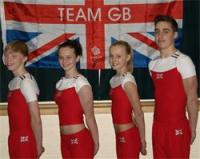 Weston AGC
Weston AGC
I first met James at a South West Gymnastic conference and thought he was superb then, and still do! James' ability to adapt to different sports and levels is excellent, and he is superb at getting his message across to different ages of gymnasts. He did a workshop at our club for our competitive gymnasts and it was superb, His work was of great value to a wide range of ages and levels, with a tremendous emphasis on posture and injury prevention. We have been able to put his training methods into practice and are seeing an improvement in the all round strength and fitness of our gymnasts.
More


Comments
[…] Ultimate guide to eating before competing […]
[…] are the best options for snacking when competing and training?” Is a question I get asked a lot, I did a practical Q&A session with some […]
[…] and fuel intake within 15mins post exercise. main meal within 2 hours. 1.5 litres of water for every kg lost or for […]
[…] is important to eat properly before competing and breakfast is the best […]
[…] Guide to competition eating : what you need to eat before, during, and after competing. […]
[…] During competitions, a gymnast does a lot of waiting around. It is vital that they stay hydrated throughout the day. Small and regular sips will help this. A light breakfast and regular snacks like fruit or nuts will maintain their energy levels (more on competition eating here). […]
[…] Guide to competition eating […]